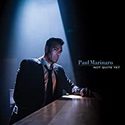|
Here are three vocal outings that mostly explore romantic love, with everything from the mushy to the morose. Happy endings are not always in view. (Hint: Two of the collections include the song "Born to Be Blue.") On the distaff side we have two singers named Judy (Niemack and Whitmore) and our male hero facing the challenges of finding and recovering from love is Paul Marinaro.
 PAUL MARINARO PAUL MARINARO
NOT QUITE YET
122 Myrtle Records
CD, Digital
With impressive results, Chicago-based singer Paul Marinaro and an impressive instrumental team revisit established songs to release their lurking melancholia or rev them up with newfound muscularity. Bold brass sparks with excitement, a string quartet delivers elegance, and the guitar work of his co-arranger Mike Allemana weaves through the selections with authority, providing intimacy with sensitive, supportive accompaniment.
Most of the 14 selections are standards. There are a few Brazilian pieces and one by Stephen Sondheim ("I Remember"). But who would predict that two of the most authoritative performances on a cabaret-entrenched performer's collection would be songs by David Bowie? They are the haunting "5:15 The Angels Have Gone" and "No Plan." Three words from that one's lyric give Not Quite Yet its title and the singer changes the street mentioned in the song, Second Avenue, to "Myrtle Avenue," matching his record label's name.
Moods range from "A Wonderful Day Like Today" from the musical The Roar of the Greasepaint - The Smell of the Crowd with its ebullience to the gloom of "Born to Be Blue." The latter seethes with built-up resentment and suggests the fatalistic attitude of a toughened survivor with scar tissue.
With solo guitar accompaniment, a deeply felt and intimate "Remind Me" (Jerome Kern/ Dorothy Fields) has fresh phrasing that emphasizes individual thoughts with effective pauses, barely uttering words (to imply being devastatingly wounded) and slowing down the tempo for a key realization. (A couple of lines are changed, including a switch at the end that trades the original word play and romantic acquiescence for a more downbeat resistance that is in keeping with this more overall fraught and troubled take.)
Elsewhere, Paul Marinaro and company go rosily romantic with two numbers that have idyllic images, courtesy of lyricists Marilyn and Alan Bergman: "Make Me Rainbows" (music by John Williams) and their English words for the melody by Ivan Lins called "The Island." Chances are taken on love songs like "Taking a Chance on Love" (from the 1940 Broadway musical Cabin in the Sky) by taking them more seriously overall, building them by varying the attitude from one verse to the next, repeating a line, bending a few notes here and there, dramatically adding strength and/or passion with sustained notes. Well, there's a lot of passion sustained in Not Quite Yet.
 JUDY NIEMACK JUDY NIEMACK
WHAT'S LOVE?
Sunnyside
CD, Digital
Hearing even an established singer with an appealing timbre present understated performances can seem underwhelming on first listen. For me, that was the case in being exposed to the ten originals on Judy Niemack's new 13-track collection, What's Love?, written by her in collaboration with varying partners (and one, "Catalyst," alone, which characterizes and celebrates the effect of a new relationship, with "I was frozen 'til you brought me to life"). Most of these felt elusive, but they grew on me when I revisited them.
Still, I find her performances on the three established songs to be much more effective and rewarding showcases for her vocal richness and the ability to commandingly paint moods. Judy Niemack's many releases over the years were more heavily populated by classics from the Great American Songbook and jazz repertoire; incidentally, she'd first taken on one of the choices here, "Born to Be Blue" by Mel Tormé and Robert Wells, on an early album (Blue Bop, 1989). The timbre is still supple and seems to defy effects of age. "For All We Know," the 1934 standard, is a highlight, imbued with thoughtful phrasing, lingering over lines to bring out the bittersweet wondering and also the make-the-most-of-the-moment attitude. Slowed down, Tina Turner's big hit "What's Love Got to Do with It" emerges, sans growls and most angst, as a pensive and sober reconsideration.
The fine musicians here get much focus, with the instrumental breaks given generous time, even allowing more than just one such voice-free interlude. Guitarist Peter Bernstein is also the co-writer of three pieces. Also on board are pianist Sullivan Fortner, bassist Doug Weiss and drummer Joe Farnsworth, with saxophone player Eric Alexander guesting on one track: the one he collaborated on crafting, "Let Life Lead You."
Absent easily accessible commercial melodies but tethered to lyrics that are more plain-spoken and arguably pat rather than poetic or pithy, the originals offer an odd mix of components. What's put forth on What's Love's new love songs feels like the jazz descendant of art songs posed as stream-of-consciousness conversations or self-affirmations. In "Let Life Lead You," the go-with-the-flow encouragement includes the advice to "Stay loose/ Don't fight/ You'll be all right." On "I'll Love Again," written with Steve Nelson, a friskier melody supports the blithe optimism of the words insisting that one romantic break-up not being the end of the world: "The past is gone/ And time moves on/ The future's calling me... I'll take a chance and trust myself again/ And find what's best for me/ Whether I'm right or wrong/ I'll be where I belong."
Judy Niemack celebrates the release of What's Love? at Pangea in downtown Manhattan on December 7.
 JUDY WHITMORE JUDY WHITMORE
ISN'T IT ROMANTIC
Arden House Music
CD, Digital
Without being dramatically daring, distinctive or dazzling, singer Judy Whitmore's Isn't It Romantic is an agreeable listening experience. The voice is inarguably pretty, the musicians are straight-ahead solid, and the songs–mostly oft-recorded top-drawer standards–are treated with fondness and respect.
Pleasant and warm-spirited, free of edge and erring on the side of emotional and musical caution, it's an undemanding, lilting recital that doesn't break a sweat and doesn't break the heart. Granted, that's partially due to the song selection that favors requited love and a kind of "polite" approach, emphasizing serene scenes when the course of true love does run smooth. Or at least almost as silky-smooth as the performances here. So, Judy Whitmore tends to bask in the bliss. Lyrics that do reference worry that affection might not be returned are not dwelled on with pessimism, such as the self-chastising line in "You Go to My Head" that goes "I say to myself, 'Get ahold of yourself/ Don't you know that it never can be.'" But there is one outlier that impresses with the potential to plumb the depths of depression and loneliness that can come "In the Wee Small Hours of the Morning." Otherwise, Isn't It Romantic makes its title very much a rhetorical question as it floats through the 90-year-old Rodgers & Hart gem it's named for and 11 more. ("The Birth of the Blues" doesn't count as a blue mood since, of course, it's about the blues as a style of music, not sadness; and, besides, the delightful duet with guest vocalist Peisha McPhee is about as sunshiney as it could get.)
The presence of pianist/conductor Tamir Hendelman, who also worked on some of Isn't It Romantic's arrangements, is a major plus. He and flutist Lori Bell add particular sensitivity to the landscape. Another point in the collection's favor is the inclusion of the introductory verses to some of these standards. Too frequently dismissed as unnecessary by singers, they can ideally set the stage and deftly define the focus, and they're handled sensitively here (in "The Nearness of You," for example).
Even though there are instances when more abandon or nuance could make these renditions more riveting instead of relying on safe, soft-focus rapture, Judy Whitmore still seems empathetic to lyricists' expressions of emotion, not offhanded in delivery. Fittingly, this elegant lady, whose past careers include being a therapist and airplane pilot, can be analytical and is not one to let songs we know by heart coast on "automatic pilot."
|
|